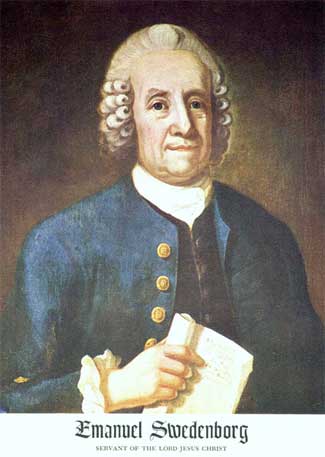2005 11 03
By Gary Lachman | enjoyment.independent.co.uk
 What do William Blake, Jorge Luis Borges, Arnold Schoenberg, August Strindberg, Honoré de Balzac, Aldous Huxley, Czeslaw Milosz and Charles Baudelaire have in common? Aside from being individuals of genius, all were influenced by the work of a gifted thinker whose ideas have been overshadowed by his vivid accounts of his "occult" experiences.
What do William Blake, Jorge Luis Borges, Arnold Schoenberg, August Strindberg, Honoré de Balzac, Aldous Huxley, Czeslaw Milosz and Charles Baudelaire have in common? Aside from being individuals of genius, all were influenced by the work of a gifted thinker whose ideas have been overshadowed by his vivid accounts of his "occult" experiences.
In Sweden, Emanuel Swedenborg (1688-1772) is recognised as one of the great figures of the Enlightenment, a polymath genius who turned his mind to an astonishing number of pursuits. An inventor, anatomist, mineralogist, philosopher and ethicist, Swedenborg applied himself to more intellectual tasks than most university faculties ever get around to. He discovered a lunar method of establishing longitude at sea (just missing the prize that went to John Harrison), devised new ways of constructing docks, and designed a submarine, an aeroplane and a machine gun.
Nor was that all. The editor of Sweden's first scientific journal, he anticipated the nebula theory of solar and planetary creation. His explorations of the brain predate many "discoveries" not revealed until the 20th century. He published several scientific tomes, wrote erotic poetry, travelled across much of Europe, hobnobbed with royalty and, when he wasn't occupied with his duties as Assessor in the Swedish Board of Mines or his responsibilities as a member of the Diet, thought a great deal about the infinite, God and man's place in the cosmos.
Why then is this Scandinavian Da Vinci not better known? Because in 1744, when Swedenborg was in his mid-fifties, he went through a profound psychological and spiritual crisis, culminating in a visitation by Christ and his own entrée into the spirit world. Swedenborg abandoned his scientific work and for the remaining years of his long life devoted himself to what he considered his destined task: the deciphering of the hidden, "internal" sense of Scripture, the full explication of which would usher in the New Church and Christ's second coming - not a physical return, but the unveiling of the Bible's true message, hitherto obscured by Catholics and Protestants alike.
Collected in his gargantuan Arcana Caelestia ("Heavenly Secrets"; Swedenborg wrote all his books in Latin), his esoteric exegesis informs many of the themes we find in Blake's poetry. Lars Bergquist's monumental biography - the first major one in more than 50 years - is rightfully dedicated to establishing Swedenborg's significance as a religious and ethical thinker. However, he tends to play down what most of Swedenborg's readers, now and then, find fascinating in his work: his matter-of-fact accounts of his visits to heaven, hell and the purgatorial realm he calls the "spirit world".
In dreams, trance and meditative states lasting several hours, Swedenborg entered the spirit world and there spoke with angels, evil spirits, the inhabitants of other planets and the dead, and his descriptions of the life beyond, for all their dry factuality - not to mention sheer strangeness - often ring with a powerful poetic force.
For example, in heaven, he tells us, no matter which way they turn, angels always face God. Space and time do not exist there; distances are measured by angels' affinity to one another. Swedenborg was no stranger to sex, and in heaven the delights of "conjugial love" are exquisite, our spirit forms subject to sensations of which our dull, earthly bodies are ignorant. Conversely, hell is a realm of "scortatory love", which sounds like a really bad affair. That Swedenborg, according to Bergquist, saw "the soul's highest, divine happiness as comparable to a sexual orgasm", may explain why for years he published his books anonymously abroad, anxious to avoid censure.
Placing Swedenborg squarely in the political, economic and social life of his time, Bergquist broadens our view of a character who too often receives only mentions in histories of the occult. Linking spiritual insights to very worldly concerns, like the abolition of the British slave trade, he shows how Swedenborgian ideas have had a concrete effect on our world.
Equally enlightening is his account of Swedenborg's early years, when as an ambitious young man he burned with a passionate lust for knowledge and nursed an aching hunger for fame, something he hoped that one of his scientific pursuits would supply. These days, outside Sweden, Swedenborg's science is little known, and his occult adventures, although essential to his less sensational work, may have, as Bergquist argues, brought him only notoriety and disrepute. Perhaps this new work will turn this around and bring the "Buddha of the North", as the Zen scholar D T Suzuki called him, the recognition he deserves.
Gary Lachman is the editor of 'The Dedalus Occult Reader: The Garden of Hermetic Dreams' (Dedalus 2005)
Article from: http://enjoyment.independent.co.uk/books/reviews/article322953.ece
Related: Emanuel Swedenborg: Traveller of the Inner Realms
Emanuel Swedenborg (freemasonry.bcy.ca)
